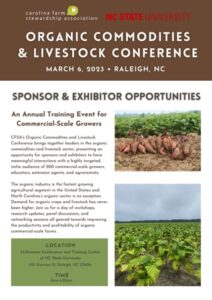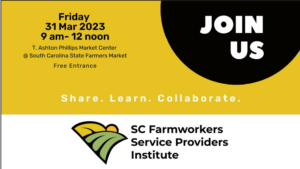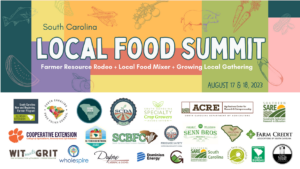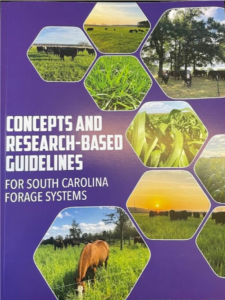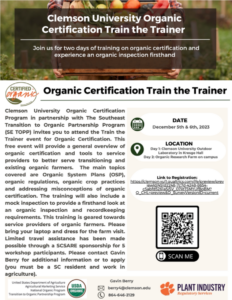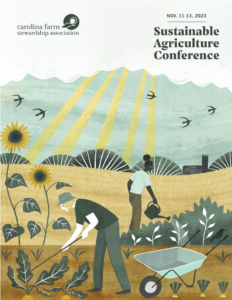Progress report for SSC23-A001
Project Information
The 1862 land-grant MSP Assistant will be based at Clemson University’s Pee Dee Research and Education Center in Florence SC (Co-located with Clemson’s SARE Coordinator). The Assistant has eight years of experience with the Clemson Extension Service presenting programs on plant breeding to stakeholders statewide, appearing on the panel of SCETV’s “Making It Grow” program, organizing the Pee Dee REC Field Day, and providing graphic design/videography communication support where needed. Working closely with the state SARE coordinators, the Program Advisory Committee, and the new 1890 land-grant MSP Assistant, the 1862 Assistant will support and promote the SC SARE PDP program.
In June 2024, the current 1862 MSP Assistant Jonathan Windham, stepped down. Kelly Flynn will be serving as the new MSP for the SC SARE Program.
To the extent possible we emphasized an interdisciplinary and participatory approach to training. Primary audiences for trainings were 1862 and 1890 Extension agents, NRCS conservation field staff, and other agriculture professionals. Agriculture professionals who serve small-scale, minority and limited resource farmers as well as those serving larger-scale conventional farms were encouraged to attend. Strong stakeholder participation and input into educational program development reinforced trainee participation and enthusiasm for programs. Participants in the educational programs will increase competency and skills in areas related to sustainable agriculture. They will have gained the knowledge and confidence (i.e. competency) which will enable them to respond positively and knowledgeably to client inquiries regarding principles and practices of sustainable agriculture. Their participation will also facilitate their integration into the sustainable agriculture community such that they will be able to refer clients to additional people/resources. We also observed that participation in educational programs and interaction with other participants increased the trainee’s level of enthusiasm such that they become increasingly strong advocates for sustainable agriculture. In 2023 we sought stronger participation from both 1862 and 1890 Extension agents.
Advisors
- (Researcher)
- (Educator)
- (Researcher)
- (Educator)
Education
To the extent possible emphasized an interdisciplinary and participatory approach to training. Primary audiences for the trainings are 1862 and 1890 Extension agents, NRCS conservation field staff, and other agriculture professionals. Agriculture professionals who serve small and large scale farms, both conventional and organic/regenerative, were encouraged to attend. Strong stakeholder participation and input into educational program development reinforced trainee participation and enthusiasm for the program. Participants in the educational programs increased competency and skills in areas related to sustainable agriculture. They gained the knowledge and confidence (i.e. competency) that enabled them to respond positively and knowledgeably to client inquiries regarding principles and practices of sustainable agriculture.
Education & Outreach Initiatives
Input from this public meeting was used to prioritize issues and formulate plans for statewide sustainable agriculture training and education programs in 2023.
On January 12, 2023, the SC SARE Program partnered with the Clemson IPM Program to host an annual open forum. This open forum allowed for networking among extension agents, farmers, agencies, non-profits, and researchers while providing the SC SARE program with feedback regarding areas that these stakeholders felt should be focused on for 2023.
2023 SC SARE Open Forum Minutes
Discussions were held regarding what initiatives and areas SC SARE could better serve in. This open discussion allowed for prioritization of resources and recognition of areas for collaboration (see minutes).
Annual training event for commercial-scale growers to learn about organic livestock production
Attendees were educated and introduced to the concept of organic livestock production
Annual meeting of the SC Farmworkers Service Providers Institute. This organization works with farm workers to bring together service providers for the farmworker community.
The SC SARE Program supported ($500) this meeting. This meeting was specifically focused on service providers/extension. Training addressed sustainability in a few ways: primarily building relationships between those working in sustainable food systems and those supporting farm workers.
This training strengthened the sustainable food hub network in South Carolina
To provide ag. resources to local growers
Growing Local South Carolina is partnered with Clemson Extension's New and Beginning Farmer program to host a two-day "SC Local Food Summit" local farming and food event in Columbia, SC. This collaborative two-
day event engaged the core farming & food system organizations in the state. The SC SARE Program sponsored $1,500 for this event.
This event supported multidisciplinary collaboration and provided resources to growers (grant resources, loan services, educational resources) that they might not have otherwise known about. The event also worked to strengthen the local food network of SC.
To produce a publication regarding forage systems in SC
The SC SARE Program funded the publication of a training publication, Concepts and research-based recommendations for forage systems in South Carolina by Dr. Liliane Severino da Silva et al. (2023)
Available here: https://www.researchgate.net/publication/371120650_Concepts_and_research- based_recommendations_for_forage_systems_in_South_Carolina
This book was successfully published and used as educational material for trainings regarding sustainable forage production in SC
A train-the-trainer session geared towards educating future organic certifiers
This event successfully trained 49 participants in how to become certified organic inspectors
The annual Carolina Farm Stewardship Association Sustainable Agriculture Conference
Since 1986, Carolina Farm Stewardship Association’s annual conference has drawn folks from across the food system — farmers, foodies, researchers, educators, and activists — for a celebration of innovation in local sustainable agriculture. The SC SARE Program sponsored $1,000 in sponsorship fees and $1,100 Extension agent registration.
The conference expanded participants' knowledge in sustainable agriculture while providing a chance for networking and collaboration. This conference also offered exposure for the SC SARE Program with those who may be unfamiliar with SARE.
Educational & Outreach Activities
Participation summary:
Learning Outcomes
Project Outcomes
Face of SARE
The SC SARE webpage was revised and migrated to a new platform (Clemson WordPress). Updates included the new Clemson Co- Coordinator Dr. John Andrae (taking over for Dr. Matt Smith) and additional SARE Resources. The webpage is an important promotional tool for allowing us to post updates, events, and news regarding the SC SARE program.
https://blogs.clemson.edu/sc-sare/
The SC SARE listserv is contacted regularly and instructions to unsubscribe are made clear for anyone who wishes to do so. This is important to prevent SC SARE from developing a reputation for being "spammy". The listserv is used to share updates about the SC SARE program and news from related programs.
